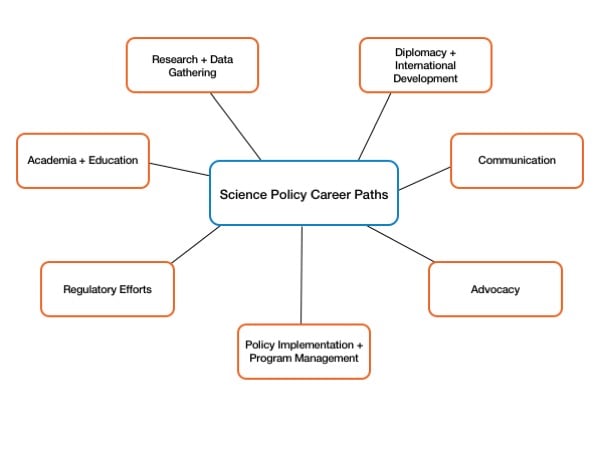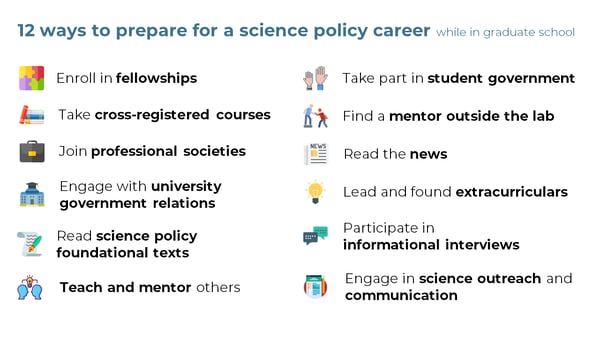This post was contributed by Steph Guerra, a AAAS Science and Technology Policy Fellow at the Veterans Health Administration.
“But, seriously, what even is science policy?”
I have been asked this many times throughout my short science policy career and this seemingly simple question is a moving target. There are a multitude of options for achieving success in a science policy career with many opportunities to pivot and grow along the way. That’s what makes it so wonderful.
The most challenging part of jumping into this career path from academia is the uncertainty of it all. Though I had spent the first few decades of my life following a very straightforward conveyor belt from high school to college to graduate school, standing at the start of a science policy career was much more circuitous and unknown. In fact, in less than two years of walking away from the bench, I have worked for seven different organizations in a variety of science policy roles including fellowships, volunteer positions, and part-time opportunities. But even through all my roles and my current work as a AAAS Science and Technology Policy Fellow (STPF) at the Veterans Health Administration, I could never get one straight answer about what science policy even is! In this article, I hope to provide a brief explainer of the who, what, where, when, why and most importantly, how, of a science policy career.
Who does science policy?
I’ve intentionally started with the ‘who’ question because the science policy community is the best part of working in this profession. The folks who work in science policy come from a wide variety of backgrounds with technical expertise that ranges from astronomy to bioethics to chemical engineering and everything in between. Plus, there are many science policy professionals that entered the field from a more traditional policy background, learning the science part on the job. Each path to science policy is unique and this creates a rich and diverse workforce. Out of all the career spaces I explored for my post-PhD life, the science policy community is the one that was consistently welcoming. This bears repeating. Individuals that work in science policy are a treasure--they love the work and the mission so much that they will often move mountains to give advice and guidance to those that ask. Relationship building is key in science policy. Luckily, there are many mechanisms in place to ensure your effective networking---and they’re more accessible than ever thanks to the virtual world that the pandemic has foisted upon us.
Action Items:
- A simple place to look for science policy folks is on Twitter- start an account and start engaging with the #scipol hashtag. Often there will be posts about virtual meet ups and happy hours that you can attend to help build relationships.
- Reach out to a science policy professional over Twitter or LinkedIn to learn more about their career trajectory. If there’s one thing everyone loves, it’s talking about themselves--so don’t be shy and reach out! Someone from your alumni community is a great place to start.
What is science policy?
THE IMPOSSIBLE QUESTION. Science policy is the work you do to creatively connect seemingly disparate individuals and ideas toward solving one problem. It often requires thinking about a problem in a new way through the integration of science with a large set of other societal pressures including economic, cultural, and political. Science policy looks differently depending on how and where you pursue it. It can manifest via research and data gathering, regulatory efforts, policy implementation, program management, communications, diplomacy and international relations, advocacy, and writing legislation (see Figure 1 for career map). The beautiful part of science policy is that you can jump from one type of position to another throughout your career. Plus, just one role can encompass many of these activities leading to a rich day-to-day work life.
Action Items:
- Join the National Science Policy Network to connect with early career science policy groups, attend webinars, and learn more about the field.
- Read the CCST Science Policy Career Guide to learn more about science policy as a profession.
 |
| Figure 1: Science policy can lead you to many paths! For a more details, check out Steph's science policy career map. |
Where can you do science policy?
Because the field of science policy is so diverse, you can do it in so many places-- not just the government. When you talk to folks about science policy, there is often discussion of “big P” and “little p” policy.
“Big P” policy is what you might typically think of. It occurs in a government setting: drafting legislation, making rules, and implementing the policy within the jurisdiction of the governing body. This type of work can happen at the national level within the executive branch or in Congress, or can also happen at the state and local level. The big secret about science policy that I didn’t learn until arriving here in DC, is that so much policy actually happens outside of the government itself. You can work to influence Big P policy from a post in non-governmental organizations, universities, professional societies, and industry through convening activities, formal lobbying, or strategy setting.
The “little p” policy is non-governmental work happening at large organizations who have to develop policies for their communities. Think a university system who develops evidence-based university policy to combat sexual harassment in academia or a large company who decides how they are going pursue regulatory approval for a new product or a well-endowed philanthropy who can shift the funding landscape to focus on a neglected disease area. Depending on the organization, these changes to policy could shift how society interacts with certain scientific areas. Whether you’re interested in “big P” or “little P” policy, the possibilities are endless leading to many ways for you to find your own niche.
Action Items:
- Explore this career map to learn more where science policy roles exist.
- Explore these resources compiled by the AAAS Science and Technology Policy Fellowship Program to learn more about where science policy happens.
When do you do science policy?
Many science policy training programs and fellowships have a strong focus on early career researchers who have decided to transition out of academia from graduate school or a postdoc. But some are also open to individuals from mid- to late-career backgrounds. In fact, many of my AAAS STPF cohort members came to DC to do either a sabbatical year or transition away from academia as tenured professors. There’s never a bad time to start your science policy journey.
In fact, working in science policy doesn’t have to be a complete career pivot. There are many ways to pursue your interests in policy or advocacy as a supplement to your career through engagement with your local or state governments. Most communities have opportunities to join commissions or boards, support ballot initiatives, deliver public comments, meet with local representatives, or even run for office yourself! Plus, at the federal or state level some professional societies host “Hill Days” where they train and bring researchers to Congress to advocate for increased science funding and other issues. Whether you want to pursue science policy as a full-time career or a part-time passion, there are many ways to make it work for your time and interests.
Action Items:
- Sign up to receive updates from ESAL and explore their Local Engagement Playbook for step-by-step guides on how to engage in your local community.
- Read the National Science Policy Network blog for more ideas of when and how to get involved.
Why do you do science policy?
I would argue that this is the most important question that you can explore. The answer will help you decide how to define the who, what, where, when, and how of your own science policy journey. It takes a whole lot of self-reflection and confidence. You will likely speak to a lot of folks working in science policy that have a ton of advice for you and your next steps. This advice is important, but must be taken through your own personal lens.
For me, the Veterans Health Administration was the perfect position because my science policy ‘why’ was to develop expertise in health policy and healthcare systems so I could understand how to make new treatments and technologies accessible to patients. And what better place to do that than at the nation’s largest integrated healthcare system? Defining your why is what will make you a competitive candidate for any science policy position and will likely be the bulk of your evaluation criteria in interviews or essays. Note: the answer to this question may change over time and that’s perfectly normal!
Action Items:
- Start a career journal during your current job and note what makes your heart sing, what makes you pull your hair out, your successes, failures, and challenges you’ve overcome. This information may help you determine what parts of your current job you want to keep or change and can inform your move into science policy.
- Read broadly about the historical roots of science policy to connect to your why. I suggest this crowdsourced list of foundational texts as a starting point.
- Assess and develop your own science policy proposals. Check out the Day One Project for some example proposals and consider applying for their accelerator for some hands-on guidance.
- Check out my webinar via the NC Science Policy student group SciPolPack for a more detailed discussion on how to to define your why.
How do you do science policy?
Just like there are many different types of science policy careers, there are many ways to enter this career trajectory. One common route of entry is through a science policy fellowship program which is a temporary position- anywhere from a few months to a few years- that gives you experience in policy work. The benefit of a fellowship is that you are often vetted for your general scientific expertise and then once selected, you can pivot to a completely new field without issue. This may be more challenging if you are trying to apply for an outright job in a field where you have no specific scientific credentials.
But before you even apply to that first science policy job or fellowship, there are ways you can hone important skills for the profession. One of the most important skill sets for a science policy career is science communication so an outsized way to prepare is to do lots of writing and presenting for non-scientist audiences during your time in graduate school through outreach organizations and science blogs. Other avenues for skill development include leadership of extracurricular organizations, working in student government, and teaching and mentoring others (see more in Figure 2). Starting early demonstrates not only your interest to future positions, but will also make your transition from academia to the policy world much smoother.
Action Items:
- Explore this comprehensive resource developed by Dr. Kelly Singel which provides an overview of all available science policy fellowships in federal, state, and local governments, professional societies, industry, and beyond!
- Learn and develop valuable science policy skills in graduate school via this report from the Scientific Citizenship Initiative.
- Get practical experience in science communication by writing for the Journal of Science Policy and Governance.
- Get involved! The best way to learn about science policy and to connect with the community is through working with them on fun projects. NSPN, local advocacy groups, and student science policy groups are great sources of volunteer opportunities. NSPN maintains a great resource guide including conferences, societies, and outreach groups.
- Grab a virtual coffee to chat with someone working in a science policy space you’re interested in. Many fellowship programs can connect you with alumni before and during your application process so you can learn more!
 |
| Figure 2: The many ways to prepare for a science policy career. Image used with permission from SCI. |
Many thanks to our guest blogger Steph Guerra, a AAAS Science and Technology Policy Fellow at the Veterans Health Administration.
 Steph Guerra, PhD, is currently a AAAS Science and Technology Policy Fellow at the Veterans Health Administration where her work focuses on incentivizing the real-world impacts of health services research. She is particularly interested in driving scientific and technological innovation that is accessible and equitable for all. You can follow her on Twitter at @Steph_Guerra
Steph Guerra, PhD, is currently a AAAS Science and Technology Policy Fellow at the Veterans Health Administration where her work focuses on incentivizing the real-world impacts of health services research. She is particularly interested in driving scientific and technological innovation that is accessible and equitable for all. You can follow her on Twitter at @Steph_Guerra
Additional resource on the Addgene blog:
- Browse our blog posts on science career options
- Read blog posts on professional development
Topics: Science Careers, Science Career Options






Leave a Comment